Existing User Log In
New User Registration
Register for a free account to gain full access to the VGChartz Network and join our thriving community.



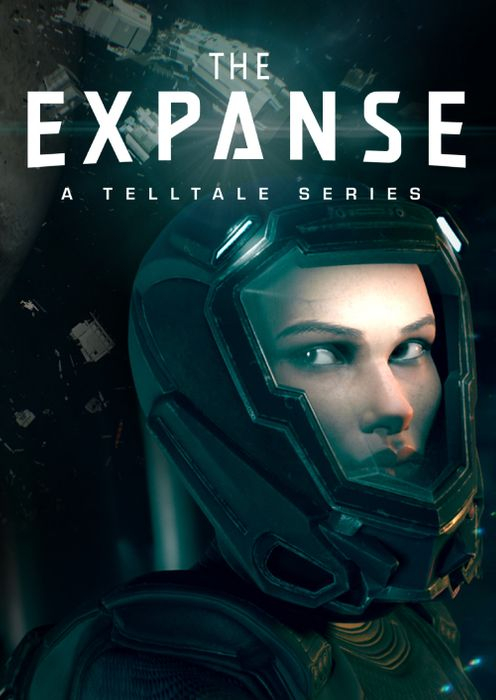

America - Front


America - Back

Telltale Games
Deck Nine
Adventure
 (Add Date)
(Add Date) (Add Date)
(Add Date) (Add Date)
(Add Date)
| Owners: | 0 |
| Favorite: | 0 |
| Tracked: | 0 |
| Wishlist: | 0 |
| Now Playing: | 0 |
Return of the king! Well, perhaps that's too presumptuous a title, given how this specific clade of Simon-Says adventure titles never really lost their way after Telltale Games' previous closure. Still, there's no denying their influence when the moniker of "Telltale adventure," and the limited mechanics that entails, lives on today. But that popularity subsequently led to TellTale going defunct, given how its template became a crutch to mass-produce content. Now why does that sound familiar? With this resurrection also comes a shift in focus. Rather than the growing overreliance on comics, new Telltale's first entry (co-developed with Deck Nine) takes on another notable license: The Expanse.
Acting as a prequel story, Expanse stars the show's Camina Drummer. Beginning in medias res as she prepares to shoot her commanding officer out the airlock, the game then flashes back to a calmer setting. The Artemis is promised to be first on the scene of a major wreck orbiting Jupiter, according to her commander. Being tempted with a huge cut of the cargo, she and the crew make their way to uncover it and the grisly fate of the wrecked crew.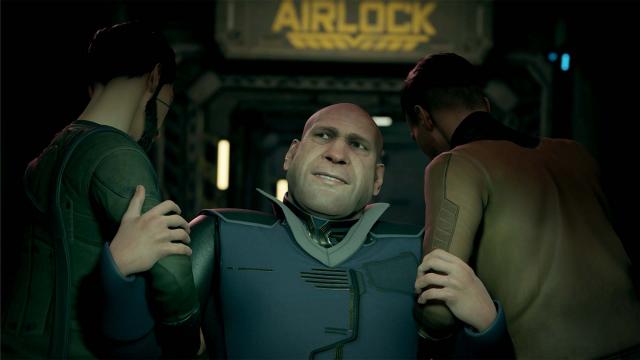
For a game headlining developers like Deck Nine, of Life is Strange: True Colors and Before The Storm infamy, it's nice to see a script that actually maintains a consistent throughline. There's the focus of scoring the big haul with a notable adversary giving chase, the comradery between several side characters, and certain split-decisions that carry tactical and moral weight. The vacuum of space doesn't give you the luxury of short reprieves and plot detours while Portlandia's latest hipster band (who’re just copying The Lumineers again) plays in the background. There's a consistent set of intentions and obstacles that are being challenged by different people.
Paring down on potential distractions can have an opposite effect as well. For an Expanse virgin like me – who's genuinely intrigued by the show and books – it's tougher to fully grasp the context of every world-building element. The supposed tension around Drummer's backstory (including the bounty against her) doesn't latch on for me like a veteran; however, I'd still emphasize that's partly the game's fault in not elucidating that background with more steps. A more universal complaint would be a serviceable, yet two-dimensional cast. Who can guess the kindly medic has more going on than meets the eye? Who thinks the disparate temperaments between two brothers plays into later events? This isn't to outright dismiss genuine character development, but the story too often feels like it stops short of wholly owning those bigger moments.
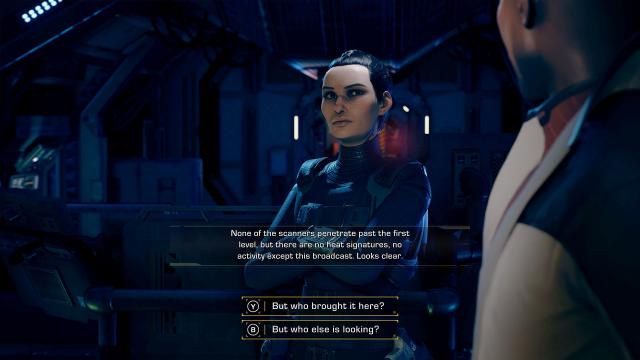
Perhaps a slim part of its lack stems from mismanaged presentation. The moment Drummer's oversized thumb for a commanding officer is seen, you can tell Telltale's return didn't come with an endless cash flow. That's not to discount obvious engine and UI upgrades that match the world, but the plastic look for character models simply doesn't retain the same charm it had before; other games are doing it better. Similarly, Expanse's voice acting roster is a mixed bag between commendable veterans to some relative newbies. Cara Gee's Drummer is the star of the show – and she sells it quite well, but the supporting characters simply don't ascend heights seen in The Walking Dead: Season One.
This negativity – however fair – shouldn't dismiss what's nonetheless a satisfying yarn. Even if more development or intrigue with the supporting cast could've gone a long way, The Artemis still houses an interesting crew worth learning more about. The dynamics between characters are interwoven with a plot that wants to maintain momentum. It's like a good balancing act: keeping to a good tempo that in turn ensures the crucial character beats are succinct and tied with the story. It aligns closely to sci-fi adventure serials of old, but this universe's grounded rules avoid it becoming too campy. It's not without a few writing potholes, but never enough to lose my interest.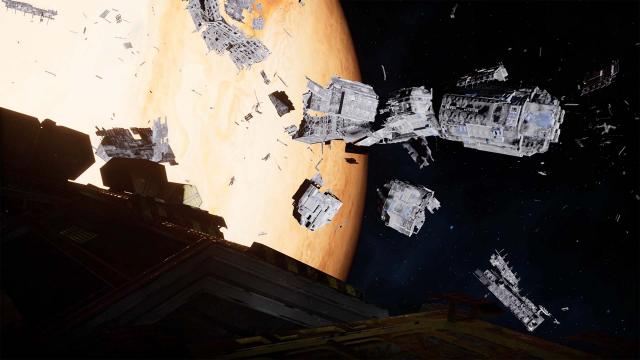
What is a "TellTale game" without a clutter of quick-time events (QTEs) to trudge through? Yes, the oft-maligned structure of decisions of varying importance, flow charts at a chapter's end, and correctly-timed button prompts remain as you'd suspect. It comes with the territory. The only aspect I'd take special exception to is the common decision-making critique. Shelving the choices that actually created tangible ripple effects, the main intention with these choices is for the context to inform "your Drummer," whether for headier moral quandaries or being more personable towards strangers. Whether or not that perspective seems too abstract, even those metrics are more faithfully executed with recent competition like Star Trek: Resurgence.
The one gameplay ace up its sleeve would be the zero-g segments. On both a presentational and mechanical front, it captures The Expanse's better potential. It's a wild disparity to think of the weird, rubbery faces during dialogue contrasted with stunning skyboxes. You get a taste of it from the main cover: Drummer's hermetically-sealed suit scootering through a ship graveyard with Jupiter in the background. Both in aesthetic and design, the environmental artists hit all the right cues in luring players to explore every nook and cranny. Granted, it's not like these segments are teeming with a plethora of doodads or hidden extras; nevertheless, the freeform flying adds an extra layer to appreciate the world along with light puzzle-solving. "Succinct" is the choice word for it.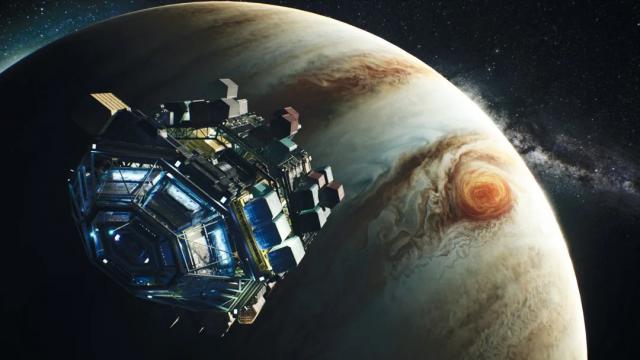
Succinct also encapsulates the runtime compared to previous Telltale titles. With a helping of detours, it'll clock in at a brisk 6 hours. For a $40 price tag, or $45 for the Deluxe Edition that includes a standalone episode, that's not the most impressive; that said, it's tough to emphasize that critique when it's done in the name of pacing. To see Deck Nine's name strapped to a project that doesn't dawdle is a feat unto itself in my book. It's perfectly adequate for a complete prequel story.
After several years, Telltale's royal return to the narrative adventure spotlight is an odd duck – but not in a bad way per se. Given the repertoire of more prominent blockbuster IPs to select from, it's neat to see The Expanse as Telltale's returning salvo. But this thawing out of cryo-sleep doesn't mean the rest of the creative world was standing still. Even when considering specific expectations for episodic adventures, other titles have done more in expanding certain elements, even if only by inches in the grand scheme. That doesn't disregard Telltale & Deck Nine's accomplishments – especially as a story that deepened my interest for this world altogether – but rather cements why it's just a conditional recommendation.
Contractor by trade and writer by hobby, Lee's obnoxious criticisms have found a way to be featured across several gaming sites: N4G, VGChartz, Gaming Nexus, DarkStation, and TechRaptor! He started gaming in the mid-90s and has had the privilege in playing many games across a plethora of platforms. Reader warning: each click given to his articles only helps to inflate his Texas-sized ego. Proceed with caution.









